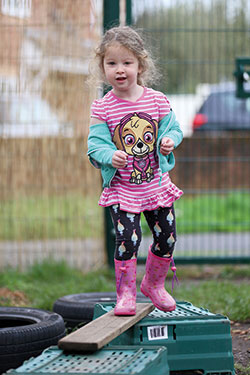
Download the PDF of this article
GIGGLERS DAY NURSERY
- The nursery was converted from a derelict pub by Kym and Gavin Wells and opened in January 2013.
- It offers 55 places and currently has 78 children on roll.
- Its baby room caters for children under the age of two, and it also offers a toddler room and a pre-school room.
- Eighteen members of staff are employed. Of these, one has Qualified Teacher Status, and 15 hold early years qualifications at Level 4, Level 3 and Level 2.
- Kym is currently completing a BA in early years leadership and management, carrying forward research she completed for a foundation degree in early years practice.
At Gigglers there is no danger of a playful outdoor activity becoming predictable or too easy. When a child has mastered the art of jumping off the water butt, they can have a go at creating a tower of crates, climbing a tree or balancing beams and tyres. At the Bolton-based setting, staff see their children as powerful, active adventurers who are prepared to try things that may have an uncertain outcome.
The large garden can be endlessly reinvented, with its two trees and tree swing, grass, flagstone and decking areas, man-made tunnel, music wall and tepee. There is a mud kitchen that provides real mud to make pies and other culinary creations, a digging area with trucks and tools, and a mechanics’ garage to provide space for children to role-play and narrate their own play.
AS NATURAL AS POSSIBLE
Gigglers was granted land from the local council to extend its outdoor provision from a small decked area to a large garden. Before work began, Ms Wells embarked on a six-month research project, visiting many settings in order to gain insights into different approaches to outdoor learning.
‘On the basis of this we realised how important it is to embrace children’s natural drive to explore, test their own abilities and to play without restrictions in an environment that they can create themselves,’ she says. ‘Right from the beginning we aimed for the kind of space that the children were telling us they wanted.’
Children certainly had lots of their own ideas. ‘One group went out into the community and took photos of their favourite things, while another participated in mind-mapping discussions about what they like to play with,’ says Ms Wells. ‘Favourites included swings, tunnels and plenty of space to ride bikes and build dens.’
OBSTACLE COURSE
 At Gigglers, children access the outdoors for a minimum of three hours throughout the ten-hour day, and experience all weathers. Plenty of time is given for them to test their capabilities at their own pace.
At Gigglers, children access the outdoors for a minimum of three hours throughout the ten-hour day, and experience all weathers. Plenty of time is given for them to test their capabilities at their own pace.
‘Through climbing the trees, swinging on the rope swing and building their own climbing structures from planks, crates and tyres, the children strengthen all their muscles,’ says Ms Wells. ‘They move their bodies in different ways and recognise the effects of exercise on their abilities. In this way they learn what their bodies are capable of.’
The nursery favours loose parts over fixed structures as it feels these can be adapted to different stages of development and provide more opportunities for collaborative play and problem-solving.
‘It’s all about them creating challenges which they themselves feel confident about overcoming and then they gradually push the boundaries,’ says Ms Wells. ‘For example, a child can build a structure that they want to climb to a level they feel comfortable with, and then extend it when they are ready.’
The staff have noticed there are few negative behaviour issues outside. ‘We see children playing more with others outdoors and being sociable,’ Ms Wells says. ‘They also work better in a team situation. Collaborative play is important for building confidence – children challenge and copy each other, imitating one another’s behaviour and overcoming obstacles together.’
She adds, ‘We let them work problems out for themselves and we find they do – incredibly quickly.’









